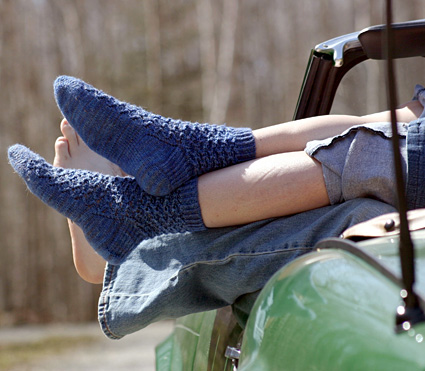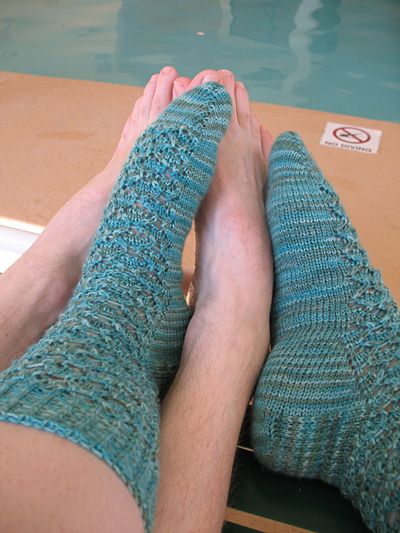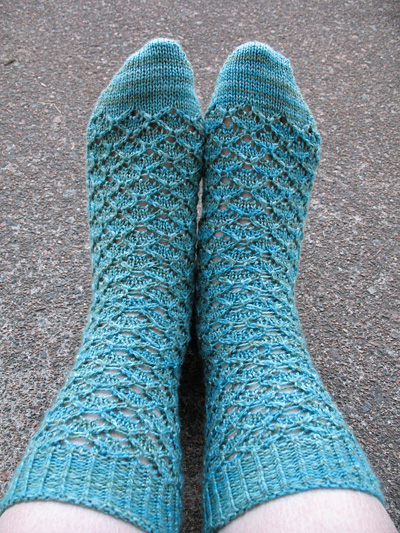|













![Read exactly what FREE PATTERNS really means...respect our designers and authors rights [and thank you]](../images/OFFnavLEGAL.gif)



 
|
 |
 <click
for more! <click
for more!


|

  by
Deb Barnhill by
Deb Barnhill

A 2006 poll commissioned by McGregor
Socks revealed an interesting tidbit: East Coast Canadians are more
likely than anyone else in the country to leave our socks on while,
um, coupling. How fitting that this pattern should be born in Nova
Scotia and written for a Nova Scotia yarn! If warm summer nights
find you still needing a little something to keep your feet cozy,
curl up for a weekend with your iced tea and your needles. The end
result will give new meaning to slipping into something a little
more comfortable.
The stitch pattern is a modified version of the Fancy Trellis Stitch
from Mon Tricots 1300 Pattern Stitches, printed in France in the third
quarter of 1979. This book, in tatters and marked up by its previous
owner, was a terrific yard sale find that I find invaluable for design
purposes. The stitch sequence is almost too simple to be called lace.
Repeated over just 7 stitches and 8 rows, it will find its way into your
memory in no time.
Sea Wool is an exciting new blend of wool and Seacell, a soft, highly
breathable fiber derived from seaweed. Seacell has anti-inflammatory
properties, has been shown to protect the skin and possesses a decadent
sheen.
Coupling is worked from a short-row toe with lacy gusset increases and
a no-gap reverse heel flap. The stitch pattern has a fair bit of stretch,
particularly in the vertical direction. Leave the foot length just a
bit on the short side to really wake up the stitch detail.
|
 photos: Nancy
McLaughlin (blue sock), Deb Barnhill (green sock), Todd Barnhill
(headshot) photos: Nancy
McLaughlin (blue sock), Deb Barnhill (green sock), Todd Barnhill
(headshot)
| | | |
To fit an adult womans foot, with instructions included for a higher instep
Directions are written as follows:
Regular [Higher instep]
| |
|
Circumference: 7.5 inches unstretched; will comfortably stretch to fit up to 12.5 inches
Length: To fit | |
|
 Fleece
Artist Sea Wool [70% merino wool, 30% seacell]; 385 yd/350
m per 115g skein]; color: Periwinkle [shown above] Spring [shown
below]; 1 skein Fleece
Artist Sea Wool [70% merino wool, 30% seacell]; 385 yd/350
m per 115g skein]; color: Periwinkle [shown above] Spring [shown
below]; 1 skein
 Small
amount smooth waste yarn Small
amount smooth waste yarn
 2
US #2/3mm circular needles, 20 inches or longer 2
US #2/3mm circular needles, 20 inches or longer
 Crochet
hook Crochet
hook
 Small
amount smooth waste yarn Small
amount smooth waste yarn
 Tapestry
needle Tapestry
needle
| |
|
| 30 sts / 48 rows = 4 inches in charted pattern, unstretched | |
|
[Knitty's list of standard abbreviations and techniques can be found here] |   These
socks are worked from the toe up on two circular needles. If you
are unfamiliar with this technique, instructions may be found here. These
socks are worked from the toe up on two circular needles. If you
are unfamiliar with this technique, instructions may be found here.
If you prefer, the socks may be worked using the "Magic Loop" technique,
or on double-point needles. If using double-point needles, take care
when dividing stitches over patterned portion, to ensure that yarn
overs are not missed or dropped.
Throughout the pattern, when instructed to "m1" (make one
stitch), insert the left needle from front to back under the horizontal
strand which lies between the last stitch worked and the next stitch,
and knit into its front loop. This will produce visible, lacy increases
over the gussets. When worked this way within the charted pattern,
there is no need to work a yarn over at the beginning or end of the
needle (see the Cheater Chart).
Crochet Cast On
Using waste yarn, work a crochet chain several sts longer than the number of sts to be cast on. Starting 1 or 2 sts in from end of chain and using working yarn, pick up and k 1 st in the back loop of each ch until the required number of sts have been picked up. Later, the chain will be unraveled and the resulting live sts picked up.
1x1 Twisted Rib (Worked over an even number of sts):
Round 1: [K1 tbl, p1] around.
Repeat this round for 1x1 Twisted Rib.
Chart Notes:
You may choose to work from either the Basic Chart or the Cheater Chart below. Both will give the same result, but the Cheater Chart uses m1 increases in place of the yarn over increases which would be worked at the ends of the needles. (It may look odd, but try it; it works!)
If you are unfazed by the prospect of working a yarn over at the beginning or end of a needle, go ahead and use the Basic Chart.
If you are working from the Basic Chart, the chart pattern will be repeated 4 times on each needle. If you are working from the Cheater Chart, the chart is worked once for each needle, and the Pattern Repeat section will be worked twice. |
|
|
  Using Crochet Cast On, CO 28 sts. Using Crochet Cast On, CO 28 sts.
Row
1 [WS]: P all sts.
Row 2 [RS]: K27, W&T.
Row
3 [WS]: P26, W&T.
Rows 4-19: Work as for Rows
2 and 3, working each row 1 st shorter than the last.
Row 20 [RS]: K10, W&T.
Row
21 [WS]: P10, p next st together with its wrap, W&T.
Row
22 [RS]: K11, p next st together with its two wraps, W&T.
Row
23 [WS]: P12, p next st together with its two wraps, W&T.
Rows
24-37: Work as for rows 22 and 23, working each row 1 st longer than the last, and omitting wrap at the end of Row 37.
Row 38 [RS]: Sl1, k26, k last st together with its two wraps.
Remove crochet chain from CO edge and place resulting 27 live sts onto a second needle, k these sts, m1. 56 sts (28 sts on each of 2 needles). K 1 round.
Note: Throughout this pattern, the first needle of the round will be referred to as Needle 1; the second needle will be Needle 2.
Foot
Set-up Round: Work 28 sts on Needle 1 in chart pattern; k to end of Needle 2.
Continue in pattern as set, working sts on Needle 1 in chart pattern and sts on Needle 2 in stockinette st, until work measures approx. 3.25[3.5] inches less than desired foot length, ending with Round 3 or Round 7 of chart pattern.
Gusset
Increase
Round: Work in patt to end of Needle 1; k1, m1, work to
last st of Needle 2, m1, k1.
Work 1 round in pattern.
Repeat these 2 rounds 8[10] times more, then work Increase Round
once more. 76[80] sts: 28 sts on Needle 1, 48[52] sts on Needle 2.
You should have just worked Round 2 or Round 6 of chart pattern.
Turn Heel
Heel is worked back and forth over the 28 sts on Needle 2.
Row 1 [RS]: Work in pattern to end of Needle 1 (Round 3 or Round
7 of pattern); k first 33[35] sts of Needle 2. Turn work.
Even-numbered Row 2-10 [WS]: Sl 1, p17. Turn work.
Odd-numbered Rows 3-9 [RS]: Sl 1, k17. Turn work.
Row 11 [RS]: Sl 1, k15, W&T.
Row 12 [WS]: Sl 1, p13, W&T.
Row 13 [RS]: Sl 1, k11, W&T.
Row 14 [WS]: Sl 1, p9, W&T.
Row 15 [RS]: Sl 1, k7, W&T.
Row 16 [WS]: Sl 1, p5, W&T.
Row 17 [RS]: Sl 1, k5, [k next st together with its wrap, k1] 3 times,
pick up and k 5 sts (1 st in each slipped st) along edge of flap.
Turn work.
Row 18 [WS]: Sl 1, p16, [p next st together with its wrap, p1] 3
times, pick up and p 5 sts (1 st in each slipped st) along edge of
flap. Turn work.
You will now have 58[62] sts on Needle 2: 28 heel flap sts, and 15[17]
gusset sts on each side of the flap sts.
Row 19 [RS]: [Sl1, k1] 13 times, sl 1, ssk. Turn work.
Row 20 [WS]: Sl 1, p26, p2tog. Turn work.
Repeat rows 19-20 13[15] times more. 30 sts on Needle 2.
Repeat row 19 once more, but do not turn work. Proceed to Leg.
Leg
Next Round: Knit across sts of Needle 1; k2tog, k to end
of Needle 2. 56 sts. This will count as Round 4 or Round 8 of chart
patt.
Next Round: Beginning with Round 5 or Round 1 of chart, work all
sts on both needles in chart pattern.
Continue in pattern as set until leg measures 1.5 inches less than
desired length, ending with Round 4 or 8 of pattern.
Work 1.5 inches 1x1 Twisted Rib.
Loosely BO all sts.
|
|
| Weave in ends. | |
|
  Deb
Barnhill sleeps barefoot and chases two beautiful toddlers in Nova
Scotia. Her
duties as a part-time hospital pharmacist include knitting socks
for all of her coworkers’ husbands. Deb
Barnhill sleeps barefoot and chases two beautiful toddlers in Nova
Scotia. Her
duties as a part-time hospital pharmacist include knitting socks
for all of her coworkers’ husbands.
She blogs her brains
out here. |
| Pattern & images © 2007 Deb Barnhill.
Contact Deb |
| |
|
|
|
|
|

